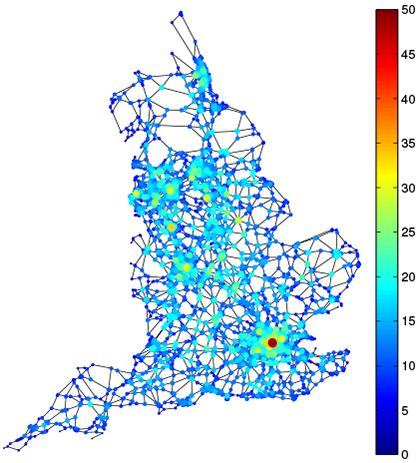Network Structure
Structure and Dynamics of Networks
 Networked systems are all around us. The accumulated evidence that complex systems cannot be fully understood by studying only their isolated constituents, has given rise to the birth of a new movement of interest and research in the study of complex networks. The expectancy is that understanding and modeling the structure of a complex network would lead to a better cottoning on its dynamical and functional behavior. Though modern network theory has produced a number of relevant results in the last few years, it is still in its infancy, particularly, when it comes to applications in real systems and to the comprehension of the relation between structure and function (dynamics). The main purpose of this research line is the study of complex networks and the collective behavior of dynamical agents that interact among them following the couplings given by the topology of these complex networks. Here we cover a range of subjects not included in (or partially related to) the previous more-specific fields:
Networked systems are all around us. The accumulated evidence that complex systems cannot be fully understood by studying only their isolated constituents, has given rise to the birth of a new movement of interest and research in the study of complex networks. The expectancy is that understanding and modeling the structure of a complex network would lead to a better cottoning on its dynamical and functional behavior. Though modern network theory has produced a number of relevant results in the last few years, it is still in its infancy, particularly, when it comes to applications in real systems and to the comprehension of the relation between structure and function (dynamics). The main purpose of this research line is the study of complex networks and the collective behavior of dynamical agents that interact among them following the couplings given by the topology of these complex networks. Here we cover a range of subjects not included in (or partially related to) the previous more-specific fields:
- the simultaneous characterization of the interactions and dynamics at a local scale and the study of their integration into a global and coherent dynamics at a system-wide scale,
- the study of how global dynamics affects local interactions,
- the statistical characterization of real networks,
- the design of realistic models,
- the study of other dynamical processes on complex networks and the emergence of collective behavior,
- the development and application of analytical tools to study complex networks,
- and the fostering of a community of (multidisciplinary) scientists, who master the discipline of complex systems and use it for their research.
Find out more by checking our main publications at: MAIN PUBLICATIONS

